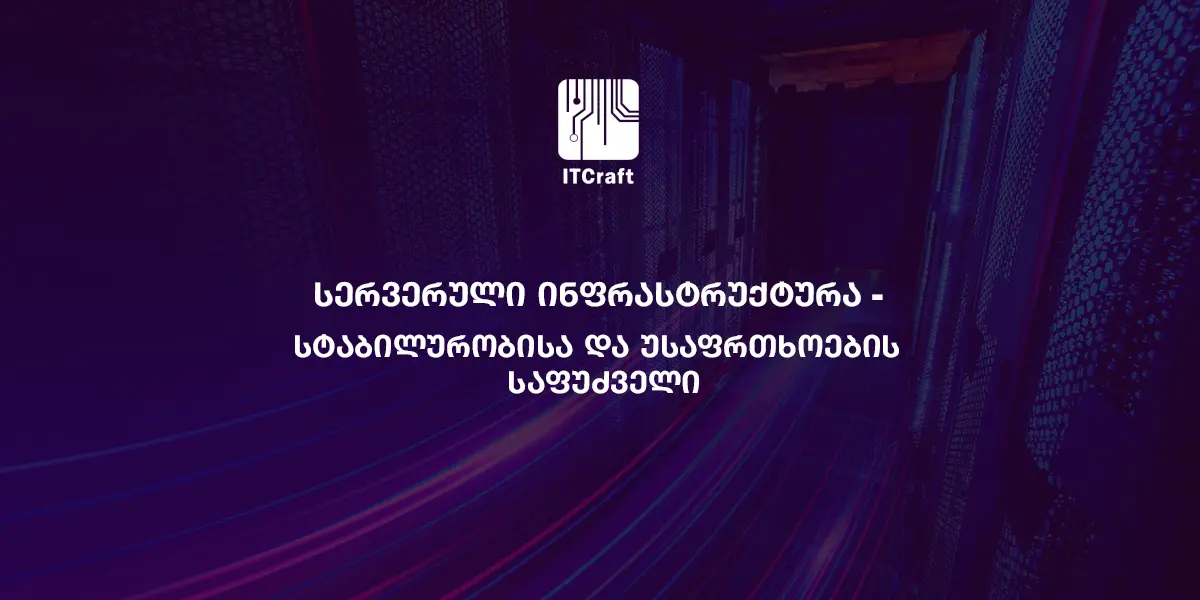Server Infrastructure: Complete Guide to Hardware and Software Solutions
Server infrastructure is a collective framework of servers, network devices, storage systems, and management tools that ensures IT service support in organizations. Properly planned server infrastructure means data security, continuous system operation, and smooth business processes.
A server, in turn, is a computer system created for sharing resources, data, and programs, both locally and through networks.
Today, when companies are increasingly dependent on digital space, server hardware provision and storage selection play a decisive role in efficiency.
Server Selection and Configuration
When selecting a server, it's important to know its type and components. You'll encounter various servers on the market, and the choice depends on the company's size and needs.
Let's examine server types:
Physical Servers (On-premises)
These servers are located in your office spaces or data center, and you manage them yourself: you decide who has access to data, how the system works, or how it should be updated. This model is often chosen by organizations that need high-level security or special compliance, for example, in banking or healthcare sectors.
For this, you'll need a server room (Data Room/Data Center), as it must constantly be:
- Protected from unauthorized access, with cameras, biometric cards, and other security measures
- Cooled - you must ensure air conditioning or have an active cooling system to prevent overheating
- Stably connected to electricity and network - to protect against unexpected shutdowns, an uninterrupted power supply (UPS) and alternative energy source are needed
Cloud-based Servers
If you don't want to set up a server room, cloud infrastructure is a better solution. In this case, server resources are managed with the help of providers such as Amazon Web Services (AWS), Microsoft Azure, and Google Cloud. This model allows you to acquire necessary resources according to your requirements and avoid managing physical hardware. Additionally, cloud infrastructure is much more cost-effective.
You should consider:
- Cloud infrastructure dependency on internet connection
- Need for constant support service from third-party providers
Hybrid Infrastructure
If you're looking for a balanced approach where both flexibility and control are your priorities, then you should choose a hybrid model. It combines physical and cloud infrastructure, storing critical data locally while using the cloud for flexibility.
Proper server selection determines how stably and securely it will handle work. Therefore, let's discuss what critical components we should consider when selecting a server:
Processor (CPU) – Intel or AMD
The processor is the server's core. It performs all computational operations. The more cores and threads it has, the faster the server will work. For example: for high-load websites or databases, multi-core Intel Xeon or AMD EPYC are better.
Random Access Memory (RAM)
RAM is essential for the server to enable fast processing of various programs. For example: if many users work on the server or overloaded programs run, we'll need more RAM (32GB, 64GB, or more).
Memory Disks – SSD or HDD
SSDs are much faster than traditional HDDs. SSD is recommended for server loading and fast data reading. HDD can be used for archiving or backup, as it has more capacity and is more cost-effective.
Cooling System
Servers generate significant heat during operation. Special cooling systems (e.g., fans, air circulation, or even liquid cooling) protect against overheating and improve component lifespan.
Network Connections (Network Interface)
The server needs fast and stable internet connection, especially if others will have access to it. At minimum, 1Gbps Ethernet ports are recommended. Firewalls and VPNs are used for security.
In Georgia, brands such as Dell, HP, Lenovo, Supermicro are available for server infrastructure, offering durable and secure physical servers or server components.
Storage Selection
Storage systems determine how quickly and securely your data will be stored and processed. Let's examine three main types of storage:
DAS (Direct-Attached Storage)
Storage directly connected to the server, for example, an external disk or internal HDD, designed for local databases. DAS is ideal for small businesses and individual servers, belonging to a specific device.
NAS Systems (Network-Attached Storage)
A network-connected device that multiple users can access. For example, an office might have one NAS and all employees use it for file sharing. NAS is becoming increasingly popular in Georgia for small and medium businesses, as it offers centralized data management and backup creation.
SAN Systems (Storage Area Network)
For large enterprises and used in data centers. It's a complex network infrastructure that ensures high-speed connection and fast data processing.
Data protection is critically important, as data loss can completely damage business operations. Let's examine what technologies can protect our databases:
RAID Technology
RAID (Redundant Array of Independent Disks) combines multiple disks: for example, RAID 1 makes an exact copy on two disks — if one fails, the other continues working. RAID 5 and RAID 10 are faster and more protected versions for large systems.
Cloud Backup and Encryption
Data backup copies are also stored in the cloud (e.g., Google Cloud, AWS, Backblaze). Encryption protects this data so third parties cannot read it, even if unauthorized persons gain cloud access.
Physical Protection in Data Centers and Updated Technology Usage
Server Software Solutions
Server software is as important a component as hardware. Server infrastructure works efficiently only on properly selected software base.
Main Operating Systems:
Windows Server Microsoft's commercial system, used when Active Directory, Microsoft SQL Server, or other Windows programs are needed.
Linux Distributions (Ubuntu, CentOS, Debian) Open-source, fast, and stable systems. Often free. Examples: Ubuntu Server, CentOS/Rocky Linux, Debian
Virtualization Fundamentals and Their Advantages
Virtualization allows you to use one server hardware as if you have several separate servers. That is, on one physical technology, it's possible to create different "virtual" servers that work independently.
This way, cost reduction is possible, it's more flexible, and infrastructure management is significantly simplified.
The most popular virtualization platforms are:
- VMware (powerful platform for large organizations, commercial purpose)
- Hyper-V
- Proxmox (free, open-source system, particularly popular in Georgia for small business representatives)
For proper server operation, constant monitoring and system management are necessary:
Zabbix, Nagios - monitoring systems that check server status: load, temperature, availability, and others. If a problem is detected somewhere, you'll receive an alert notification.
Puppet, Ansible - automation systems that help you simultaneously and automatically update programs, install services, or change configurations on thousands of servers. Ansible is simpler, while Puppet is more flexible for large infrastructure.
Choosing an IT Partner in Georgia
Reliable IT Provider = Stable IT Infrastructure for Business
In this regard, Itcraft offers you the following advantages:
- Professional team
- Server hardware provision experience
- Data center in Georgia = speed
- SLA – service level guarantee
There's no doubt that proper server infrastructure setup is a decisive step for business success. Plan your infrastructure with an experienced partner and achieve maximum results in data protection, system stability, and efficiency.
Contact us today and receive a free consultation!



